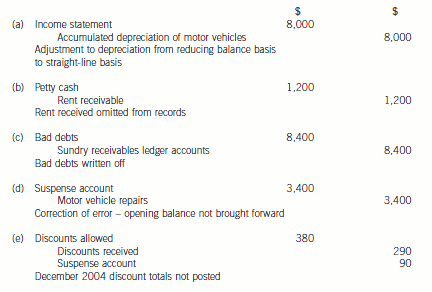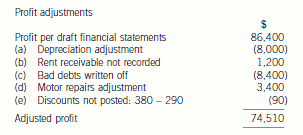2019年广东ACCA报名条件
发布时间:2019-01-06
2019年广东ACCA报名条件:
a.具有教育部认可的大专以上学历,既可以报名成为ACCA的正式学员。
b.教育部认可的高等院校在校生,且顺利通过第一学年的所有课程考试,既可报名成为ACCA正式学员。
c.未符合以上报名资格的申请者,而年龄在21岁以上,可以遵循成年考生(MSER)途径申请入会。该途径允许学生作为ACCA校外进修生学习,只须在前两年的四次考试中通过1.1和1.2两门课程,便能以正式学员身份继续参加其它课程考试。
下面小编为大家准备了 ACCA考试 的相关考题,供大家学习参考。
(b) Explain FIVE critical success factors to the performance of HSC on which the directors must focus if HSC is
to achieve success in its marketplace. (10 marks)
(b) Critical success factors are as follows:
Product quality
The fact that the production staff have no previous experience in a food production environment is likely to prove problematic.
It is vital that a comprehensive training programme is put in place at the earliest opportunity. HSC need to reach and maintain
the highest level of product quality as soon as possible.
Supply quality
The quality of delivery into SFG supermarkets assumes critical significance. Time literally will be of the essence since 90%
of all sandwiches are sold in SFG’s supermarkets before 2 pm each day. Hence supply chain management must be extremely
robust as there is very little scope for error.
Technical quality
Compliance with existing regulations regarding food production including all relevant factory health and safety requirements
is vital in order to establish and maintain the reputation of HSC as a supplier of quality products. The ability to store products
at the correct temperature is critical because sandwiches are produced for human consumption and in extreme circumstance
could cause fatalities.
External credibility
Accreditation by relevant trade associations/regulators will be essential if nationwide acceptance of HSC as a major producer
of sandwiches is to be established.
New product development
Whilst HSC have developed a range of healthy eating sandwiches it must be recognised that consumer tastes change and
that in the face of competition there will always be a need for a continuous focus on new product development.
Margin
Whilst HSC need to recognise all other critical success factors they should always be mindful that the need to obtain the
desired levels of gross and net margin remain of the utmost importance.
Notes: (i) Only five critical success factors were required.
(ii) Alternative relevant discussion and examples would be acceptable.
2 The draft financial statements of Choctaw, a limited liability company, for the year ended 31 December 2004 showed
a profit of $86,400. The trial balance did not balance, and a suspense account with a credit balance of $3,310 was
included in the balance sheet.
In subsequent checking the following errors were found:
(a) Depreciation of motor vehicles at 25 per cent was calculated for the year ended 31 December 2004 on the
reducing balance basis, and should have been calculated on the straight-line basis at 25 per cent.
Relevant figures:
Cost of motor vehicles $120,000, net book value at 1 January 2004, $88,000
(b) Rent received from subletting part of the office accommodation $1,200 had been put into the petty cash box.
No receivable balance had been recognised when the rent fell due and no entries had been made in the petty
cash book or elsewhere for it. The petty cash float in the trial balance is the amount according to the records,
which is $1,200 less than the actual balance in the box.
(c) Bad debts totalling $8,400 are to be written off.
(d) The opening accrual on the motor repairs account of $3,400, representing repair bills due but not paid at
31 December 2003, had not been brought down at 1 January 2004.
(e) The cash discount totals for December 2004 had not been posted to the discount accounts in the nominal ledger.
The figures were:
$
Discount allowed 380
Discount received 290
After the necessary entries, the suspense account balanced.
Required:
Prepare journal entries, with narratives, to correct the errors found, and prepare a statement showing the
necessary adjustments to the profit.
(10 marks)


(b) As a newly-qualified Chartered Certified Accountant in Boleyn & Co, you have been assigned to assist the ethics
partner in developing ethical guidance for the firm. In particular, you have been asked to draft guidance on the
following frequently asked questions (‘FAQs’) that will be circulated to all staff through Boleyn & Co’s intranet:
(i) What Information Technology services can we offer to audit clients? (5 marks)
Required:
For EACH of the three FAQs, explain the threats to objectivity that may arise and the safeguards that should
be available to manage them to an acceptable level.
NOTE: The mark allocation is shown against each of the three questions.
(b) FAQs
(i) Information Technology (IT) services
The greatest threats to independence arise from the provision of any service which involves auditors in:
■ auditing their own work;
■ the decision-making process;
■ undertaking management functions of the client.
IT services potentially pose all these threats:
■ self-interest threat – on-going services that provide a large proportion of Boleyn’s annual fees will contribute to a
threat to objectivity;
■ self-review threat – e.g. when IT services provided involve (i) the supervision of the audit client’s employees in the
performance of their normal duties; or (ii) the origination of electronic data evidencing the occurrence of
transactions;
■ management threat – e.g. when the IT services involve making judgments and taking decisions that are properly
the responsibility of management.
Thus, services that involve the design and implementation of financial IT systems that are used to generate information
forming a significant part of a client’s accounting system or financial statements is likely to create significant ethical
threats.
Possible safeguards include:
■ disclosing and discussing fees with the client’s audit committees (or others charged with corporate governance);
■ the audit client providing a written acknowledgment (e.g. in an engagement letter) of its responsibility for:
– establishing and monitoring a system of internal controls;
– the operation of the system (hardware or software); and
– the data used or generated by the system;
■ the designation by the audit client of a competent employee (preferably within senior management) with
responsibility to make all management decisions regarding the design and implementation of the hardware or
software system;
■ evaluation of the adequacy and results of the design and implementation of the system by the audit client;
■ suitable allocation of work within the firm (i.e. staff providing the IT services not being involved in the audit
engagement and having different reporting lines); and
■ review of the audit opinion by an audit partner who is not involved in the audit engagement.
Services in connection with the assessment, design and implementation of internal accounting controls and risk
management controls are not considered to create a threat to independence provided that the firm’s personnel do not
perform. management functions.
It would be acceptable to provide IT services to an audit client where the systems are not important to any significant
part of the accounting system or the production of financial statements and do not have significant reliance placed on
them by the auditors, provided that:
■ a member of the client’s management has been designated to receive and take responsibility for the results of the
IT work undertaken; and
■ appropriate safeguards are put in place (e.g. using separate partners and staff for each role and review by a partner
not involved in the audit engagement).
It would also generally be acceptable to provide and install off-the-shelf accounting packages to an audit client.
3 Organisations need to recruit new employees. An important step in the process is the selection interview.
Required:
(a) Explain the purpose of the selection interview. (4 marks)
3 The interview is extensively used for the selection of new employees and in many cases is the only method of selection. However,interviews have been criticised for failing to identify appropriate candidates suitable for the organisation. It is essential therefore that professional accountants recognise both the problems and opportunities that the formal selection interview presents.
(a) The purpose of the selection interview is to find the best possible person for the position who will fit into the organisation. Those conducting the interview must also ensure that the candidate clearly understands the job on offer, career prospects and that all candidates feel that fair treatment has been provided through the selection process.In addition, the interview also gives the opportunity to convey a good impression of the organisation, whether the candidate has been successful or not.
声明:本文内容由互联网用户自发贡献自行上传,本网站不拥有所有权,未作人工编辑处理,也不承担相关法律责任。如果您发现有涉嫌版权的内容,欢迎发送邮件至:contact@51tk.com 进行举报,并提供相关证据,工作人员会在5个工作日内联系你,一经查实,本站将立刻删除涉嫌侵权内容。
- 2020-04-29
- 2019-12-27
- 2020-01-10
- 2020-01-10
- 2020-01-09
- 2020-01-03
- 2020-01-03
- 2020-01-10
- 2020-09-05
- 2020-02-23
- 2021-01-16
- 2020-01-09
- 2020-01-10
- 2020-01-10
- 2020-01-10
- 2020-01-10
- 2020-02-26
- 2020-01-09
- 2019-01-06
- 2020-01-10
- 2020-01-01
- 2020-02-13
- 2020-01-10
- 2019-01-17
- 2020-01-10
- 2020-01-09
- 2020-01-10
- 2020-01-09
- 2020-01-03
- 2020-01-09